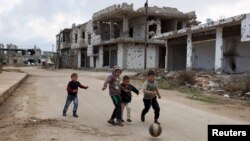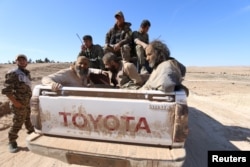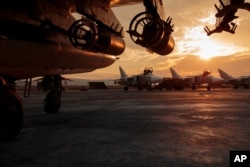U.N. diplomats are considering a Security Council resolution endorsing a U.S.- and Russian-backed cease-fire in Syria, which U.S. Secretary of State John Kerry says is "the one way that we can end this war."
Syria's warring parties have until midday Friday to say if they are participating in the cessation of hostilities that is due to begin 12 hours later.
"The alternative is that the war gets worse, that Syria might be totally destroyed, not able to be put back together," Kerry said Wednesday.
U.S. and Russian officials are holding further discussions Thursday on implementing the cease-fire, and Russia's deputy foreign minister, Mikhail Bogdanov, reiterated that his country is not discussing any alternatives to the plan.
The Syrian government has said it will take part and also will continue attacking Islamic State and al-Qaida-linked terrorists, which are excluded from the cease-fire. The truce would halt five years of fighting that has left 470,000 people dead.
The main opposition High Committee for Negotiations (HNC) gave a reserved endorsement for the cease-fire on Wednesday, saying it will participate for two weeks to determine the other side's commitment.
The HNC has also said its participation is contingent on the delivery of humanitarian aid and the end of sieges and airstrikes against civilians.
The U.S. envoy for Syria Michael Ratney said in a statement that the HNC's recommendations are being carefully considered. He also expressed hope that the maximum number of armed factions will sign on to the cease-fire.
Turkey issues warning
Turkish Prime Minister Ahmet Davutoglu warned Thursday that his country will not be bound by the truce if it is threatened by Syrian Kurdish fighters or the Islamic State group.
Turkey has carried out cross-border shelling into northern Syria targeting the Kurdish YPG militia, which President Recep Tayyip Erdogan says should not be part of the cease-fire deal.
Turkey considers the YPG to be terrorists based on their links to the outlawed Kurdistan Workers Party (PKK), which has carried out a three-decade insurgency in the country’s southeast. The PKK is recognized as a terror group by the United States and the European Union.
Obama cautious
President Barack Obama struck a cautious tone after meeting Wednesday with Jordan's King Abdullah II.
"We are very cautious about raising expectations on this; the situation on the ground is difficult," the president said.
But the American leader added, "If over the next several weeks we can see some lessening of the violence that’s been wracking that country, then that provides us a basis to build a longer term cease-fire." He said the warring parties fighting for control of Syria might eventually be able to "move forward on the political transition that ultimately is going to be necessary to bring an end to the civil war in Syria.”
In Moscow, the Kremlin said Russian President Vladimir Putin spoke Wednesday with Iranian President Hassan Rouhani and Saudi Arabia's King Salman about the impending truce. Its statement said Putin and Rouhani, who both support the Assad regime in Damascus, "stressed the importance of a further cooperation" between the two countries in fighting terrorist groups in Syria.
Russia said that Salman, who is supporting rebel groups fighting Assad, "welcomed" the truce and voiced a "willingness to work with Russia" to implement it.







